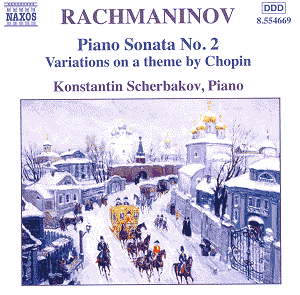Having recently been impressed with Scherbakov’s
Naxos recording of some Shostakovich piano music (8.555781), it
was interesting to hear him in more music from his homeland, this
time in the form of Rachmaninov.
As a programme within itself, this disc works
well. The Chopin Variations is a lovely piece (although
I confess my personal allegiance to the later Corelli Variations
of 1931). The way the first variation moves out of Chopin’s world
(Op. 38 No. 20) and into Rachmaninov’s territory is pure magic.
Actually the longest piece on the disc, Scherbakov maintains interest
throughout by quicksilver responses to the various variations.
There is no doubting his virtuosity (Variations 7 or 20, for example).
In addition, his even left hand in Variation 2 is most satisfying.
No less impressive, though, are the more reflective moments: try
the limpid, finely paced penultimate variation (No. 21, ‘Andante’).
The five Morceaux de fantaisie, Op. 3
of a decade earlier if anything shows Scherbakov’s strengths in
even sharper relief. The melancholic tinge to the opening ‘Elégie’
and its intimacy around half way through is managed without unnecessary
indulgence. How nice to hear the Prelude (No. 2) in context for
once, also. The melting lyricism of the third (‘Mélodie’)
contrasts superbly with the quasi-Commedia del arte ‘Polichinelle’
(Debussy’s Minstrels being called to mind here).
The Sonata is the intended selling point of the
disc (look at the scan of the front cover, if you don’t believe
me). It certainly acts as its culmination. Scherbakov opts for
the 1931 revised (truncated) version of the score. A pity the
opening is not quite gestural enough, not quite the arresting
sign-post it should be. In fact, Scherbakov seems less than convinced
of the musical worth of this first movement, and as a consequence
the music appears to ramble. Scherbakov presents the listener
with a succession of echt-Rachmaninov moments. Rachmaninov
can fragment too easily in the larger forms unless the performance
is of the utmost belief and ardour – Scherbakov just falls short
here.
Much stronger than the first movement is the
‘Non allegro’ that follows. Very affecting indeed, it is perhaps
a shame that the finale takes a little while to find its way.
There is dynamism and sweep here, but the music just fails
to take wing. Scherbakov has a tendency to be over-dry (admittedly
a typically Russian trait). Although this remains a perfectly
acceptable-verging-on-the-fine account, competition is fierce.
Horowitz, Van Cliburn emerge from the mists of the years, while
Ashkenazy on Decca Double 443 841-2 and more recently Lang Lang
(see my review of Telarc CD80524) are all persuasive. Multiple
versions are to be encouraged in this piece, especially as the
various versions (and mixes thereof) provide much food for thought.
Scherbakov, at super-budget price, provides a
perfectly acceptable Rachmaninov recital.
Colin Clarke
